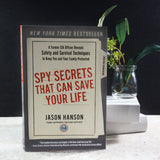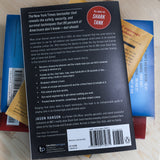




Spy Secrets That Can Save Your life
- By Jason Hanson
- Paperback: 272 pages
- This item is not eligible for discounts unless explicitly mentioned in promotional offers
-
When Jason Hanson joined the CIA in 2003, he never imagined that the same tactics he used as a CIA officer for counterintelligence, surveillance, and protecting agency personnel would prove to be essential in everyday civilian life.
In addition to escaping handcuffs, picking locks, and spotting when someone is telling a lie, he can improvise a self-defense weapon, pack a perfect emergency kit, and disappear off the grid if necessary. He has also honed his “positive awareness”—a heightened sense of his surroundings that allows him to spot suspicious and potentially dangerous behavior—on the street, in a taxi, at the airport, when dining out, or in any other situation.
In his engaging and empowering book Spy Secrets That Can Save Your Life, Jason shares this know-how with readers, revealing how to:
• prevent home invasions, carjackings, muggings, and other violent crimes
• run counter-surveillance and avoid becoming a soft target
• recognize common scams at home and abroad
• become a human lie detector in any setting, including business negotiations
• gain peace of mind by being prepared for anything instead of uninformed or afraid
With the skill of a trained operative and the relatability of a suburban dad, Jason Hanson brings his top-level training to everyday Americans in this must-have guide to staying safe in an increasingly dangerous world. -
On June 15, 1917, just after the United States entered World War I, Congress adopted the Espionage Act.
The Espionage Act gave the federal government increased leverage to prosecute what it considered unruly elements. Based on the terms dictated by Congress, anyone who interfered with or attempted to undermine the United States’ war effort could be prosecuted under the law and face a 20-year prison sentence and a $10,000 fine.
Thanks to the convenient wording of the act, those who protested against newly introduced conscription, or against the war itself, became prime subjects for prosecution.
The Espionage Act is still in effect today. Most notably, in 2013, former National Security Agency contractor Edward Snowden was charged with espionage after he leaked confidential information concerning U.S. Government surveillance programs.